The Customisation and Personalisation in Travel Market is estimated to be valued at USD 206.9 million in 2025 and is projected to reach USD 1064.6 million by 2035, registering a compound annual growth rate (CAGR) of 17.8% over the forecast period.
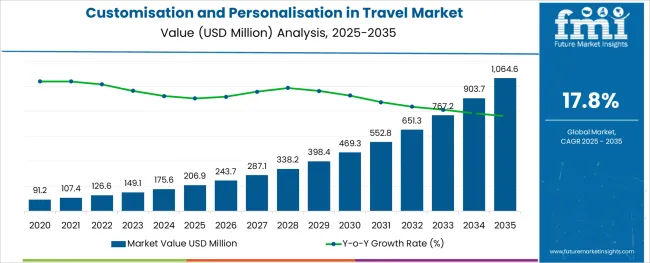
The customisation and personalisation in travel market is expanding rapidly as travelers increasingly seek tailored experiences that match their unique preferences and lifestyles. Industry trends have shown a shift towards individualized services that enhance comfort convenience and engagement throughout the travel journey. Hospitality providers have enhanced in-hotel personalization by integrating technology and guest data to offer bespoke amenities and services.
Online Travel Agency (OTA) platforms have gained prominence by providing extensive options and easy customization features that cater to diverse traveler demands. Younger generations especially millennials have emerged as key drivers of this growth due to their preference for unique authentic and tech-enabled travel experiences.
The market outlook is promising with ongoing investments in AI and data analytics enabling more precise personalisation and expanding adoption of digital booking channels. Growth is expected to be led by in-hotel personalization services, OTA platforms as booking modes, and millennials as the dominant age group.
The market is segmented by Service Type, Mode of Booking, Age Group, and Purpose and region. By Service Type, the market is divided into In-hotel personalization, In-flight personalization, Cruise lines personalization, Adventure Travel, and Other personalization.
In terms of Mode of Booking, the market is classified into OTA Platform and Offline. Based on Age Group, the market is segmented into Millennial, Generation X, Baby Boomers, and Others. By Purpose, the market is divided into Leisure and Business. Regionally, the market is classified into North America, Latin America, Western Europe, Eastern Europe, Balkan & Baltic Countries, Russia & Belarus, Central Asia, East Asia, South Asia & Pacific, and the Middle East & Africa.
The market is segmented by Service Type, Mode of Booking, Age Group, and Purpose and region. By Service Type, the market is divided into In-hotel personalization, In-flight personalization, Cruise lines personalization, Adventure Travel, and Other personalization.
In terms of Mode of Booking, the market is classified into OTA Platform and Offline. Based on Age Group, the market is segmented into Millennial, Generation X, Baby Boomers, and Others. By Purpose, the market is divided into Leisure and Business. Regionally, the market is classified into North America, Latin America, Western Europe, Eastern Europe, Balkan & Baltic Countries, Russia & Belarus, Central Asia, East Asia, South Asia & Pacific, and the Middle East & Africa.
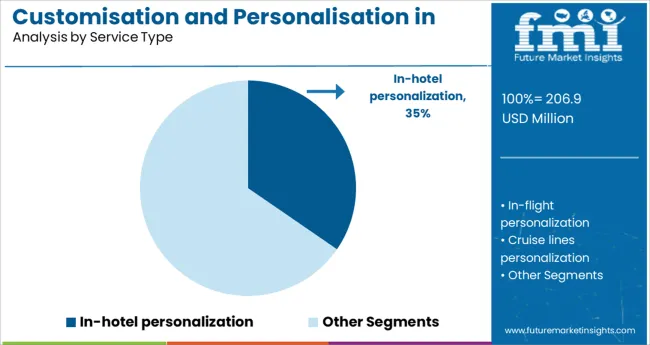
The In-hotel personalization segment is forecasted to represent 34.6% of the market revenue in 2025, holding its place as the leading service type. This growth is driven by hotels enhancing guest experiences through tailored services such as customized room settings, personalized dining options, and bespoke activity recommendations.
Hospitality operators have prioritized personalisation as a key differentiator to increase guest satisfaction and loyalty. The use of guest profiles and preferences collected through loyalty programs and direct interactions has enabled more effective personalization strategies.
Furthermore, advancements in smart room technologies and mobile apps have made it easier to deliver customized experiences seamlessly. As competition intensifies in the hospitality sector personalisation in hotels is expected to remain a crucial growth area.
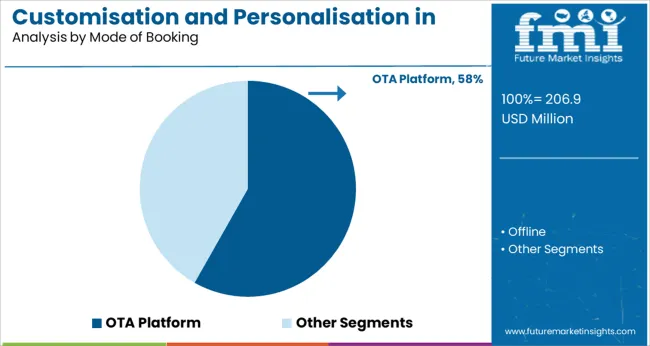
The OTA Platform segment is expected to capture 58.2% of the market revenue in 2025, establishing it as the leading booking mode. Online Travel Agencies have revolutionized travel booking by offering comprehensive options and personalized recommendations based on traveler profiles.
The convenience of comparing prices and packages along with real-time availability has driven widespread consumer adoption. OTAs have also incorporated AI-driven personalization tools that enhance user experience by suggesting itineraries accommodation and activities tailored to individual preferences.
Increased smartphone penetration and internet accessibility have further fueled OTA growth. As consumers demand faster and more flexible booking solutions the OTA platform segment is likely to maintain its dominance.
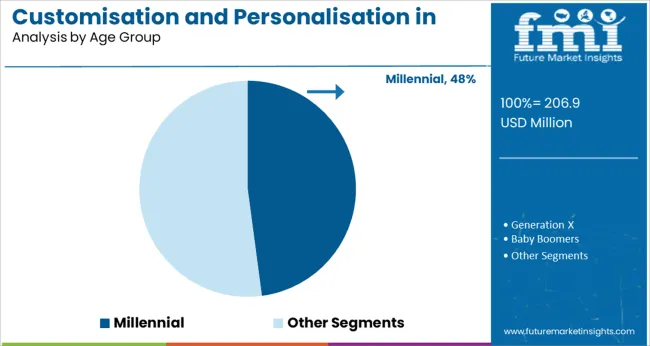
The Millennial segment is projected to hold 47.9% of the market revenue in 2025, making it the dominant age group in customisation and personalisation in travel. This generation has shown a strong preference for authentic immersive travel experiences that align with their lifestyle and values.
Millennials tend to value convenience technology and personalized services which have driven travel companies to tailor offerings specifically for this group. Social media influence and peer recommendations have also played significant roles in shaping millennial travel behavior and preferences.
Moreover millennials often prioritize experiences over material goods which has fueled demand for bespoke travel packages. As millennials continue to be a key consumer base with increasing purchasing power this segment is expected to lead growth in the personalisation travel market.
The customisation and personalisation in travel market has received a lot of traction in the industry.
There are several factors contributing to the emergence of customisation and personalisation in travel marketing today, such as the existence of millennial travellers and travel-friendly economies across the globe. The digital wave that is tearing apart the travel industry has paved the way for customised and personalised marketing campaigns. Over the last decade, new travel destinations are mushrooming across the globe, increasing demand for customisation and personalisation in travel marketing.
The use and accumulation of travel data have changed the face of the travel industry and given it a whole new dimension. Customisation and personalisation are slowly but steadily gaining traction in the market. A properly planned trip can make tourism a very different experience, creating demand for customisation and personalisation in travel.
The key to success for key stakeholders in the travel industry is to personalize and customize travel marketing. Modern-day consumers are looking for tailor-made and customized travel packages, Emails will soon be an outdated tool in the rapidly evolving travel industry. Travel companies use advanced marketing tools to promote their offerings.
The pool of aged travellers is still shunning modern and customized travel marketing due to their inexperience with new technologies. An enormous proportion of tourists are still dependent on conventional forms of travel, this further affects the adoption of customisation and personalisation in travel.
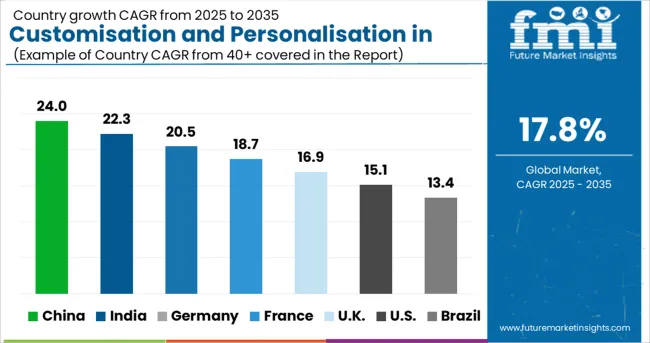
Globally, Asia-Pacific holds a significant share in the personalized travel and experiences market, and is expected to sustain its share throughout the forecast period, Asia-Pacific is known for its diverse cultures and attractive destinations. China, Japan, South Korea, India, and Malaysia have the highest concentration of outbound trips among households with higher income levels.
Moreover, Asia-Pacific tourists prefer tours, city trips, and beach holidays among holiday types in the region. International tourist arrivals in Asia-Pacific increased by 12% in 2020. The demand for customisation and personalisation in travel market is expected to grow due to increased adoption of internet-enabled phones and the internet of things.
A host of travel tools are now used by most leading travel agents around the world for customisation and personalisation in travel marketing because travel portals have created a virtual corridor for travelers, allowing them to experience the travel world on a wider scale. Modern-day travelers are shifting toward tailor-made and customized travel packages; Emails are a thing of the past; Travel companies are using advanced tools to promote their products and services, curating new opportunities for the customised and personalized travel market.
The rise of social media platforms is changing the way travel marketers market their products and services. Many travelers around the globe are using social media platforms to conduct their research before traveling, while marketers primarily use Facebook and Twitter to market their wares and services.
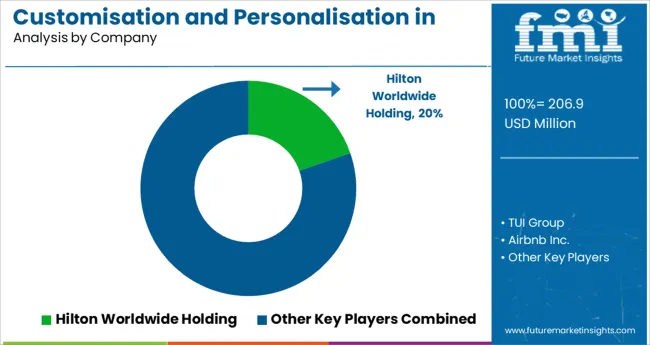
Some of the leading companies operating in the global customisation and personalisation in travel market include Best Western, Carnival Corp., Club Family Hotel, Delta Flights, EasyJet, KLM Royal Dutch, Princess Cruises, Virgin Hotels, IBERIA LAE SA, and Expedia Group, Inc.
Companies are revamping their travel marketing strategies to woo a new lot of consumers by collecting the exact information about the prospective customer and sending professional and personalized emails to ignite consumer interest in a particular tour package. These companies use sophisticated marketing tools to segregate the customer's information into segments and then design personalized emails and newsletters to entice tourists, driving growth in the customised and personalized travel market.
An active social media presence can provide an instant launch pad to any marketing or promotional activity planned by a travel management company. Thus, travel management companies are actively using social media platforms to reach out to hashtag-loving travelers. An effective social media campaign can generate new clients, while strengthening customer loyalty.
The JetBlue app then extends this experience, using geo-location capabilities to provide real-time travel updates based on location. According to a 2020 report by Amadeus, a major IT provider in the travel sector, JetBlue has "upped" its ability to deliver a consistent and immersive experience across multiple channels.
| Report Attribute | Details |
|---|---|
| Growth Rate | CAGR of 17.8% from 2025 to 2035 |
| Base Year for Estimation | 2024 |
| Historical Data | 2020 to 2024 |
| Forecast Period | 2025 to 2035 |
| Quantitative Units | Revenue in USD Million and CAGR from 2025 to 2035 |
| Report Coverage | Revenue Forecast, Volume Forecast, Company Ranking, Competitive Landscape, Growth Factors, Trends and Pricing Analysis |
| Segments Covered | Service Type, Mode of Booking, Age Group, Purpose, Region |
| Regions Covered | North America; Europe; Asia-Pacific; LAMEA |
| Key Countries Profiled | USA, Canada, Mexico, Germany, France, UK, Italy, Spain, Rest of Europe, China, India, Japan, Australia, South Korea, Rest of Asia-Pacific, Latin America, Middle East, Africa |
| Key Companies Profiled | Best Western; Carnival Corp.; Club Family Hotel; Delta Flights; EasyJet; KLM Royal Dutch; Princess Cruises; Virgin Hotels; IBERIA LAE SA; Expedia Group, Inc. |
| Customization | Available Upon Request |
The global customisation and personalisation in travel market is estimated to be valued at USD 206.9 USD million in 2025.
It is projected to reach USD 1,064.6 USD million by 2035.
The market is expected to grow at a 17.8% CAGR between 2025 and 2035.
The key product types are in-hotel personalization, in-flight personalization, cruise lines personalization, adventure travel and other personalization.
ota platform segment is expected to dominate with a 58.2% industry share in 2025.






Full Research Suite comprises of:
Market outlook & trends analysis
Interviews & case studies
Strategic recommendations
Vendor profiles & capabilities analysis
5-year forecasts
8 regions and 60+ country-level data splits
Market segment data splits
12 months of continuous data updates
DELIVERED AS:
PDF EXCEL ONLINE
Android Automotive OS (AAOS) Market Size and Share Forecast Outlook 2025 to 2035
Anderson Cascade Impactor Market Size and Share Forecast Outlook 2025 to 2035
Andersen-Tawil Syndrome Treatment Market Trends - Growth & Future Prospects 2025 to 2035
Andro Supplements Market
Handheld Electrostatic Meter Market Size and Share Forecast Outlook 2025 to 2035
Handheld Ultrasound Scanner Market Size and Share Forecast Outlook 2025 to 2035
Sandwich Panel System Market Size and Share Forecast Outlook 2025 to 2035
Hand Tools Market Size and Share Forecast Outlook 2025 to 2035
Land Survey Equipment Market Size and Share Forecast Outlook 2025 to 2035
Handloom Product Market Size and Share Forecast Outlook 2025 to 2035
Band File Sander Belts Market Size and Share Forecast Outlook 2025 to 2035
Handheld XRF Analyzers Market Size and Share Forecast Outlook 2025 to 2035
Sand Abrasion Tester Market Size and Share Forecast Outlook 2025 to 2035
Handheld Police Radar Guns Market Size and Share Forecast Outlook 2025 to 2035
Handheld DNA Reader Market Size and Share Forecast Outlook 2025 to 2035
Handheld Robotic Navigation Market Analysis - Size, Share, and Forecast Outlook 2025 to 2035
Handheld Mesh Nebulizer Market Size and Share Forecast Outlook 2025 to 2035
Dandruff Control Shampoos Market Size and Share Forecast Outlook 2025 to 2035
Candidiasis Therapeutics Market Size and Share Forecast Outlook 2025 to 2035
Hand & Arm Protection (PPE) Market Size and Share Forecast Outlook 2025 to 2035

Thank you!
You will receive an email from our Business Development Manager. Please be sure to check your SPAM/JUNK folder too.
Chat With
MaRIA